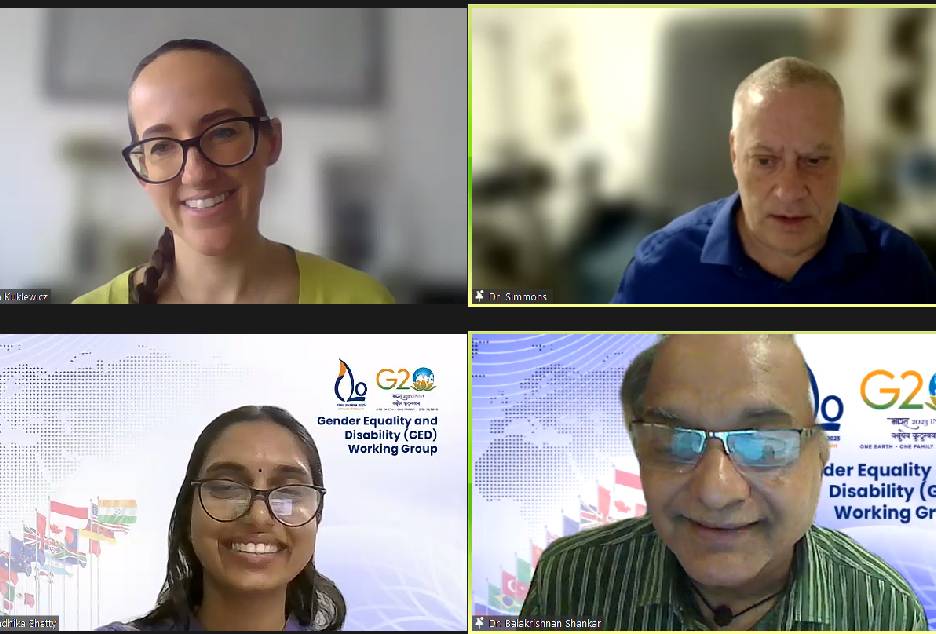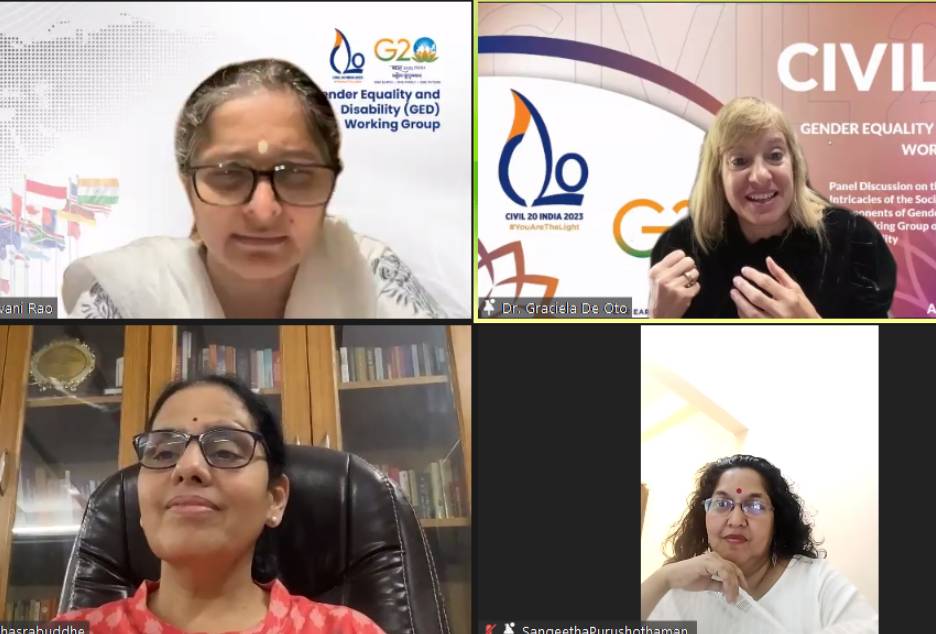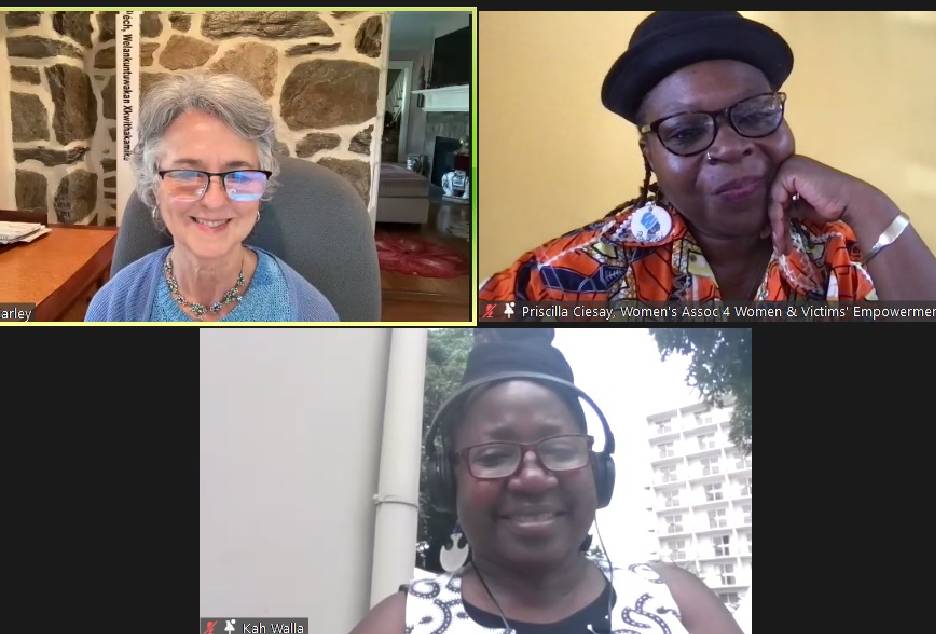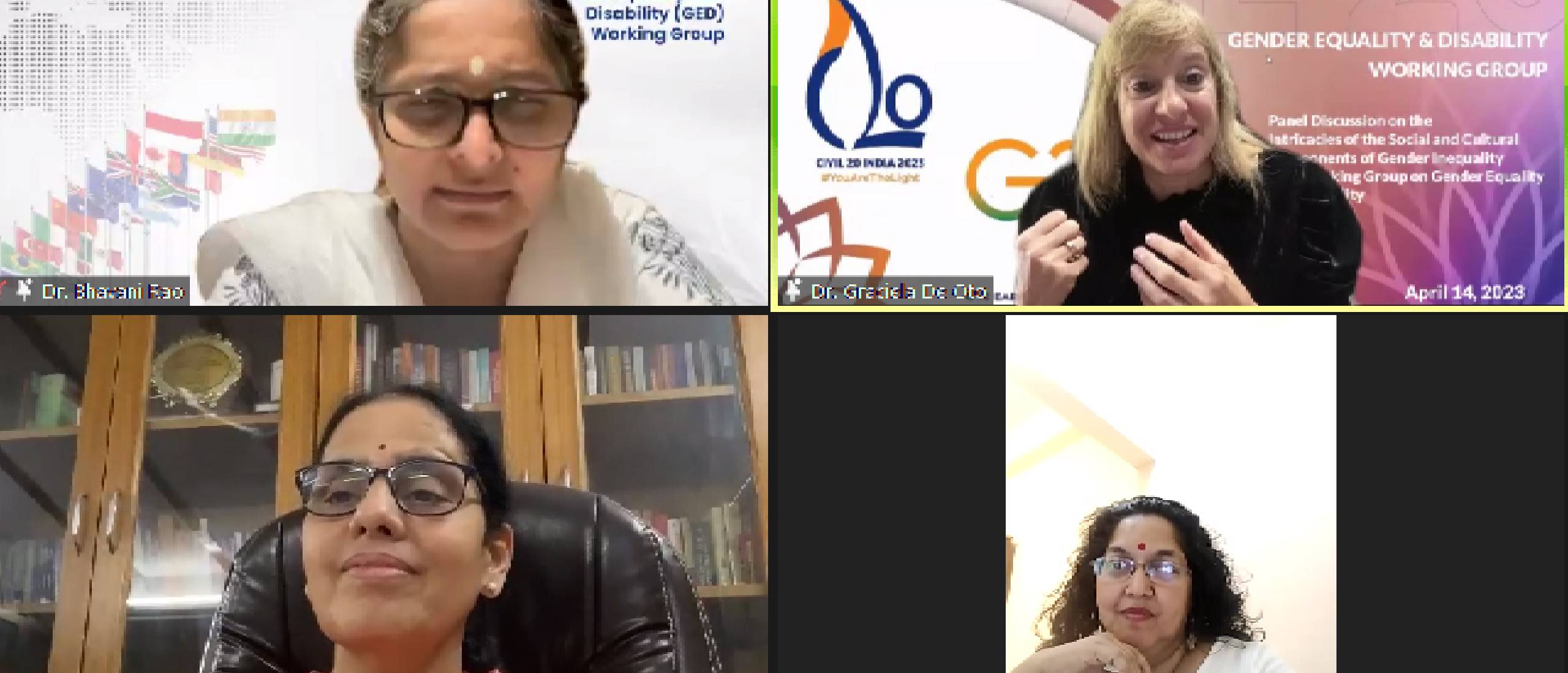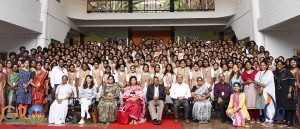A Policy Dialogue webinar on the “Intricacies of the Social & Cultural Components of Gender Inequality” was organized by the C20 Gender Equality & Disability Working Group on April 14th, 2023.
It was attended by 77 participants who were dedicated to the C20 process and featured eight distinguished panelists from nine countries: Brazil, Croatia, Ecuador, Lebanon, Sudan, Cameroon, Zambia, Belize and India. Through this event, experts were able to discuss the complex social-cultural elements of gender inequality, specifically in relation to leadership and governance, stereotypes and biases, and the balance of gender roles in both professional and personal life. Dr. Balakrishnan Shankar, Dean of the School of Engineering at Amrita Vishwavidyapeetham opened up the event by welcoming the esteemed group of moderators and panelists.
The session on Biases and Stereotypes was moderated by Dr. Simmons from the Human Rights Practice at Arizona University, and discussed the types of biases and stereotypes that the panelists were working to address. Through the discussion, the moderator emphasized that often times, lip-service is paid to concepts such as “toxic-masculinity” but rarely addressed at a policy level. The panelists included Luiza Tanuri from Promundo in Brazil, Ivana Radacic from Croatia, and Amelia Kuklewicz from the Grameen Foundation in Ecuador.
Luiza Tanuri, who is a consultant for Promundo, supports the coordination of fieldwork in the city of Rio de Janeiro and is also an international consultant for Promundo International, discussed biases and stereotypes in Brazil and the lack of gender lens in government policies due to a low representation of women in leadership positions. Promundo is an organization that works to promote gender equality and aims to build a world, freedom of violence by involving men and boys in partnership with women and girls and individuals of other gender identity. Promundo has developed innovative ways to engage men and boys in gender sensitization, such as engaging them in prenatal care and non-violent communication. She suggested that government can provide methodologies in schools to engage boys in gender sensitization, and train women to have conversations with men.
Ivana Radacic from Croatia, and a member of the UN Working Group on the Issue of Discrimination against Women in Law and in Practice, highlighted how deeply rooted stereotypes are in their country, and that these stereotypes limit women’s participation in political and social activities. As a member of the working group on discrimination against women and girls, Ivana shared how stereotypes are the root causes of discrimination against women and girls, and are visible in all areas of women and girls’ lives. Ivana suggested that in order for balance to be restored such that the value of both men and women is acknowledged, a critical exploration into how spirituality, science, race, rationality, and emotions should be leveraged, which she stated are linked to these gender-based divisions.
Amelia Kuklewicz from the Grameen Foundation in Ecuador highlighted the global nature of the problems faced by women and girls in entrepreneurship. Drawing attention to the lack of attention being paid to what women need, and prioritizing financing specifically for women, Amelia suggested that privatizing financing for women can help to provide more flexible capital for women entrepreneurs. Access and immigration-related problems can also pose challenges for women entrepreneurs, and addressing these issues should be a priority.
The Second panel discussion on Leadership and Governance delved into the challenges women face in achieving leadership positions and governance roles. The session was moderated by Dr. Joni Carley, Values-Driven Leadership & Cultural Development.
Kah Walla, a Cameroon politician, highlighted that two major obstacles to women’s participation in politics were the lack of democracy and basic human rights, as well as cultural barriers that do not view women as valid leaders. Walla suggested that to shift the leadership paradigm and move beyond the patriarchy, the oppressed, including women and youth, must demand change and non-violently stand up against oppression. Walla also emphasized that women-led movements on the ground are breaking down and building up systems in Africa, and global institutions must implement their own values and hold governments accountable to those standards.
Priscilla Ciesay from Wave Gambia discussed the challenges faced by women in Gambian politics. Ciesay stated that only 3 women are in the assembly, despite 57% of women being registered to vote, and women’s roles are relegated to being supporters of men. Cyber-bullying, lack of self-esteem, no family or community support, and the notion that women are supposed to “run the home” create significant opposition for women in politics. Ciesay emphasized that affirmative action can help marginalized women gain access to leadership positions, and having values in leadership positions is critical to fighting corruption. She cited examples of corruption in The Gambia, including unregulated imported medications that caused kidney failure and a lack of access to COVID funds in the health sector due to corruption. Ciesay suggested that working with existing laws to enhance them could address the issue of enforcement.
Overall, the panelists highlighted the need for systemic change to address cultural barriers and shift leadership paradigms to move beyond the patriarchy. The role of global institutions and accountability in governance was emphasized, along with the need for affirmative action and values-based leadership to promote gender equality in politics.
The Third panel discussion titled “Balancing Gender Roles in Work and Life” moderated by Dr. Bhavani Rao, Amrita Vishwa Vidyapeetham revolved around the need to shift from the traditional perspective of men’s role being work outside of the home and women’s role being work inside of the home. The discussion explored how through policies, a more equitable work division could be created that encourages all genders to take up domestic responsibilities, enabling women to balance domestic and professional life. The panelists discussed various aspects of the topic, including social and cultural effects on roles for women, the concept of unpaid work in the home, and the need to invoke care and compassion in all genders.
Nayana Sahasrabuddhe, Vice President of Bharitiya Stree Shakti – India raised the question of biases or social thought that could be avoided to move forward without falling back on the past in regards to care work. The discussion also touched upon the issue of who takes care of the care workers. The value of women’s key roles as primary care providers was emphasized and the importance of creating a space for women to work, based on their innate qualities.
Sangeetha Purushothaman, Director of Best Practices – India spoke on the concepts of “ease of work,” incentivizing compassionate care for men, and and leveraging collectivist approaches to help women balance their responsibilities at home while allowing them to participate in the labor force. Toward this end, Sangeetha described a movement underway, called the “Mother Center,” which enables women to share a work contract among a group of women, while also sharing their care-taking responsibilities.
Graciela De Oto, Suma Veritas – Argentina shared numerous insights concerning the persistent challenges around women’s employment and the care economy. Graciela emphasized the need for more gender-representative role models and policies that promote women’s leadership to operate from a value centric approach in order for true transformation to occur. To promote compassion and care in all genders, Graciela suggested that policies could help build values that incentivize care and compassion to support women in balancing work and life.
The panelists discussed various scenarios, including a scenario where a middle-class woman wants to go to work but has to make sure the kids are taken care of. If the formalized care network is organized by the company, they may not want to hire women because they will have to organize care networks. If they are organized by the government, they might become very rigid. The discussion highlighted the need to navigate this space and ensure that even a poor woman can access the care economy to be able to work. In conclusion, the panelists emphasized the need for role models and support for women. They suggested policies that propose flexible skills, rotational work, and other measures to support women in caregiving responsibilities. The discussion highlighted the importance of creating a collective intention to balance gender roles in work and life and implement laws and policies that promote gender equity.
